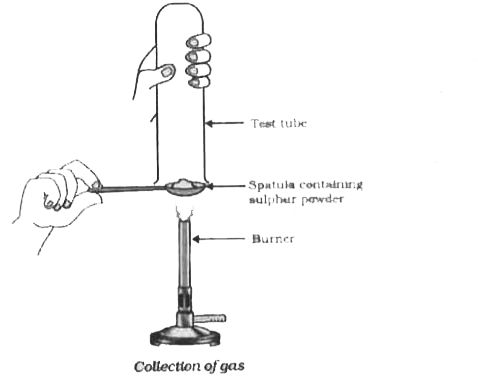Complete Solutions to EXERCISE of chapter METALS AND NON-METALS of Class 10 book with complete answers and questions
| Class 10 | CHEMISTRY |
| Chapter | METALS AND NON-METALS |
| CPC CAMBRIDGE PUBLICATION | EXERCISE |
| Number Of Questions | 20 |
| Academic Year | 2023-24 |
Which of the following pasirs give displacement reactions?
(i) NaCl solution and copper metal
(ii) `MgCl_(2)` solution and aluminium metal
(iii) `FeSO_(4)` solution and silver metal
(iv) `AgNO_(3)` solution and copper solution
View SolutionWhich of the following method is suitable preventing an iron frying pan from rusting
View SolutionAn element reacts with oxygen to give a compound with high melting point. This compound is also soluble in water. The element is likely to be
View SolutionFood cans are coated with tin and not with zinc because
View SolutionYour are given harmmer, a battery , a bulb, wires, and a switch.
a. How could you use them to distinguish between samples of metals and non-metals?
b. Assess the usefulness of these tests in distinguishing between metals and non metals.
View SolutionYour are given harmmer, a battery , a bulb, wires, and a switch.
a. How could you use them to distinguish between samples of metals and non-metals?
b. Assess the usefulness of these tests in distinguishing between metals and non metals.
View SolutionWhat are amphoteric oxides ? Give examples.
View SolutionName two metals which will displace hydrogen from dilute acids, and two metals which will not.
View SolutionIn the electrolyte refining of a meal M, what would take the anode, the cathode and the electrolyte ?
View SolutionPratyush took sulphur powders on a spatula and heated it. He collected the gas evolved by invertinv a test tube over it, as shown in figure below.

a. What will be the action of gas on
(i) dry litmus paper
(ii) Moist litmus paper
b. Write a balanced chemical equation for the reaction taking place.
View SolutionState two ways to prevent the rusting of iron.
View SolutionWhat type of oxides are formed when non-metals combine with oxygen ?
View SolutionGive reasons:
a. Platinum, gold, and silver are used to make jewellery.
b. Sodium, potassium, and lithium ar stored under oil.
c. Aluminilum is a higly reactive metal, yet it is used to make utensils for cooking.
d. Carbonate and sulphate ores are usually converted into oxides during metal extraction.
View SolutionGive reason: Sodium, potassium and lithium are stored under oil.
View SolutionGive reasons:
a. Platinum, gold, and silver are used to make jewellery.
b. Sodium, potassium, and lithium ar stored under oil.
c. Aluminilum is a higly reactive metal, yet it is used to make utensils for cooking.
d. Carbonate and sulphate ores are usually converted into oxides during metal extraction.
View SolutionGive reason : Carbonate and Sulphide ores are usually converted into oxides during the process of extraction.
View SolutionYou must have been seen tarnished copper vessels being cleaned with lemon or tamarind juice. Explain why those sour substances are effective in cleaning the vessel.
View SolutionDifferentiate between metal and non-metal on the basis of chemical properties.
View SolutionA man went door to door posing 2s a goldsmith he promised to bring back the glitter of old and dull gold ornaments. An unsuspecting lady gave a set of gold bangles to him which he dipped in a particular solution. The bangles sparkled like new but their weight was reduced drastically. The lady was upset but after a futile argument the man had a hasty retreat. Canyou play the detective to find out the nature of the solution he had used ?
View SolutionGive reasons why is copper used to make hot water tanks and not steel (an alloy of iron).
View Solution
EXERCISE questions and complete solutions for chapter METALS AND NON-METALS of CAMBRIDGE CHEMISTRY (KANNADA ENGLISH) of Class 10